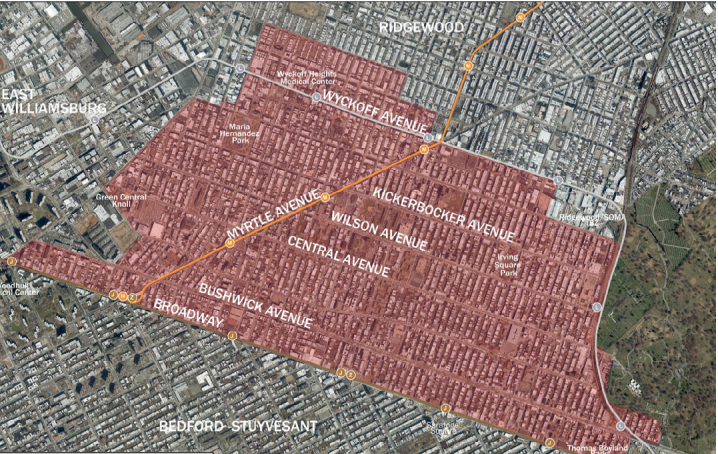On Tuesday night at a community board meeting, the New York City Department of City Planning (DCP) announced its Bushwick rezoning plan. The plan identifies Bushwick land use, housing, economic development, transportation, open space, and community health and resource strategies.
Bushwick residents, local politicians, and the Bushwick Community Plan commitee, spent four years in conjunction with council members Reynoso and Espinal to proactively present the city with a plan for the future of the neighborhood, due to the DCP’s rezoning plan.
“The moment we let the city start rezoning Bushwick, we lose,” said Ariella Riapos, founding member of an anti-gentrification group called G-REBLS, during a rezoning meeting in the fall.
The presentation lasted 45 minutes, however the city representatives answered only a couple of questions before adjourning the meeting and asking the attendees to leave, reported the Brooklyn Eagle.
The DCP proposed in their plan that the new zoning laws in Bushwick aim to preserve the character of the neighborhood by keeping height requirements on 70 percent of buildings on the residential side streets.

However, they also plan to allow higher density mixed-use development with affordable and mixed-income housing, retail, and community facility uses, along “transit corridors,” on Broadway, Wyckoff, and Myrtle Avenues. Broadway is anticipating 16-story buildings, while Myrtle Avenue will be cut off at 13-stories for new developments.
Knickerbocker, Central, and Wilson avenues labeled as “neighborhood corridors,” will expect potential medium density development with affordable and mixed income housing and retail where appropriate.
The plan also proposes to continue the housing preservation efforts in conjunction with Certificate for No Harassment (CONH) to the Neighborhood Pillars program that aide community-based organizations to acquire rent-stabilized buildings, as reported by City Limits. The DCP also promised to develop 100 percent affordable housing on city-owned land.
“What’s important to remember is that when this administration develops neighborhood plans, it does so in close cooperation with the community and its leadership, and works to preserve existing [affordable] housing and also require that all new residential development in rezoned areas includes permanently affordable homes,” wrote Rachaele Raynoff, the Press Secrety of the DCP, in an email to Bushwick Daily. “Unlike for the 2005 Greenpoint-Williamsburg rezoning, this administration has enacted the most rigorous zoning-based mandatory affordable housing plan in the nation.”
Although, this was received with some skepticism from attendees. Martha Brown, Land Use Committee Chair for Community Board 4, said that in her 25 years in the community she has not seen opportunities for affordable housing for low-income households, “So this affordable housing you are speaking of is a dream and you gotta make $72,000 a year just to get a studio deal in the neighborhood,” she said, as reported by City Limits.
The plan also included developments to the local transportation: increasing ADA accessibility to the L, J, M, and Z trains; safety improvements for pedestrians along transit corridors, and additional bike lanes in the neighborhood.
Amongst other improvements, the DCP plans to take charge of providing access to healthier food, mental health and addiction-treatment services.
“The sad reality is that some past rezonings have supercharged these trends, upending the lives of many longtime residents. The best way to ensure that rezonings do not accelerate gentrification is by giving the community a seat at the negotiating table,” wrote in an email Council Member Rafael Espinal. “That is exactly what we are doing with the Bushwick Community Plan, by putting the community in the driver’s seat to determine a framework that makes the most sense for their neighborhood.”
Local activist group in Bushwick deems the Bushwick Community Plan unhelpful, and driven only by local politicians and nonprofits instead of the community. The group previously tweeted, “This is why Bushwick residents uniting to disrupt the process altogether. Past rezonings have proven to be a racist weapon of mass displacement that pushes out longtime poor POC residents. The Bushwick community will continue to protest all proposals presented #NoRezoningBushwick”
On May 15, the DCP will present its proposal again during the community board general meeting at Hope Gardens Multi Service Center, located at 195 Linden St. at 6 p.m.
Cover image courtesy of the DCP.
For more news, sign up for Bushwick Daily’s newsletter.



